Fuel Tank Replacement Single Tank
Tools Required
J 43178 Fuel Line Disconnect Tool
Removal Procedure
- Relieve the fuel system pressure. Refer to Fuel Pressure Relief .
- Drain the fuel tank. Refer to Fuel Tank Draining .
- Remove the evaporative emission (EVAP) canister. Refer to Evaporative Emission Canister Replacement .
- Loosen the vent hose clamp.
- Remove the vent hose from the fuel tank.
- Disconnect the chassis fuel pipe (4) from the fuel tank pipe (3). Refer to Plastic Collar Quick Connect Fitting Service .
- Using J 43178 , disconnect the chassis fuel pipe (4) from the fuel tank pipe (3).
- Cap the fuel and EVAP pipes in order to prevent possible fuel and/or EVAP system contamination.
- Using an adjustable jack, support the fuel tank.
- Lower the fuel tank slightly.
- Disconnect the EVAP vent pipe from the fuel tank clips (6, 7).
- Remove the fuel tank strap bolts.
- Remove the fuel tank straps.
- With the aid of an assistant, carefully lower the rear of the fuel tank.
- Slide the front of the tank away from the frame.
- If equipped, remove the sending unit shield nuts.
- If equipped, remove the sending unit shield.
- Release the connector position assurance (CPA) retainer.
- Disconnect the fuel sender and fuel pressure sensor electrical connectors (2).
- Completely lower the fuel tank.
- Place the fuel tank in a suitable work area.
- Remove the fuel feed and return pipes from the fuel sending unit and the retaining clips.
- If necessary, remove the fuel sending unit. Refer to Fuel Sender Assembly Replacement .
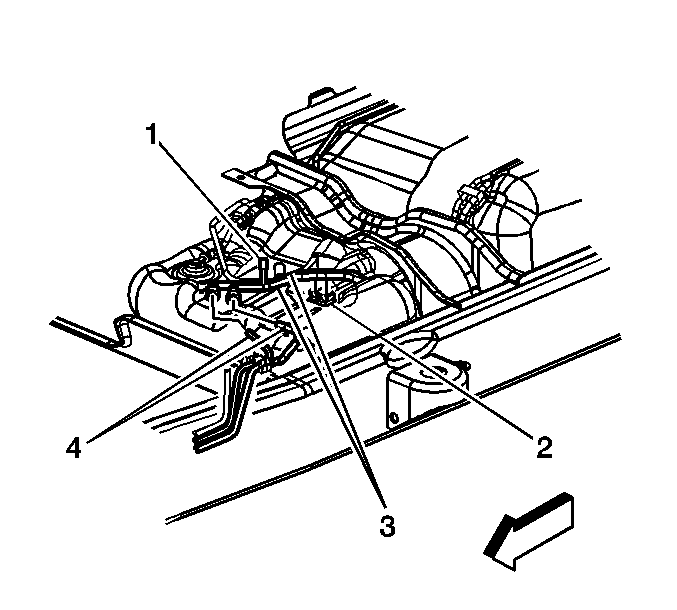
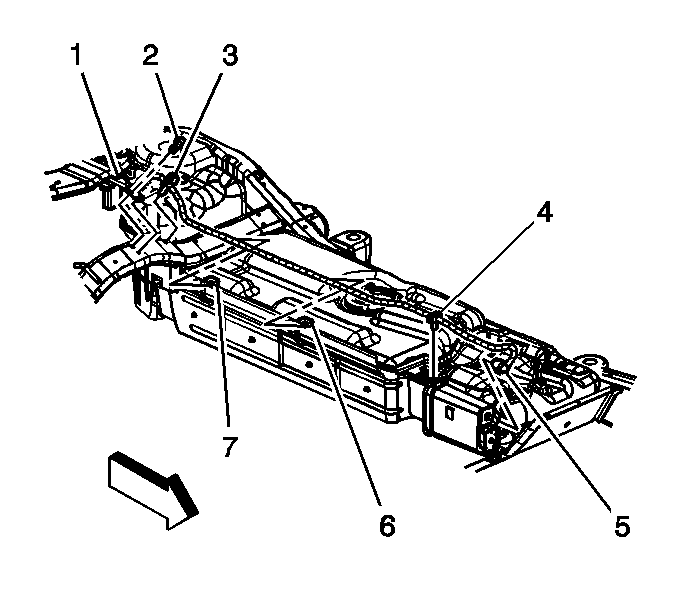
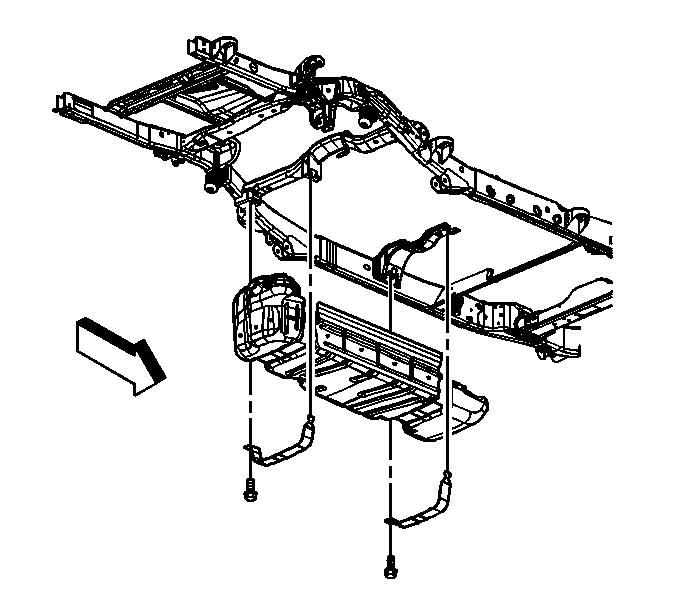
Notice: Do not bend the fuel tank straps. Bending the fuel tank straps may damage the straps.
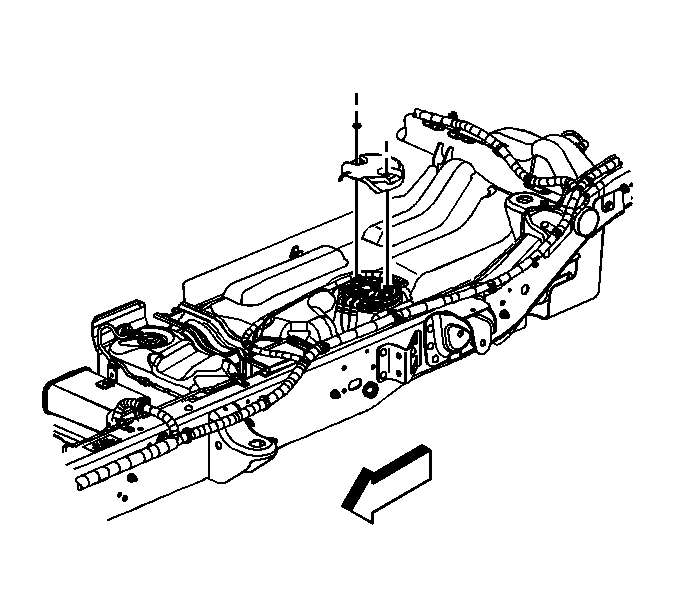
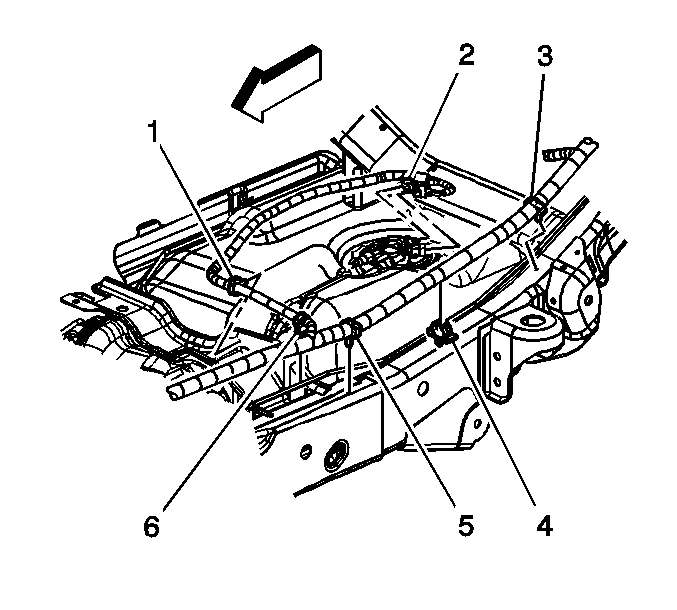
Installation Procedure
- If necessary, install the fuel sending unit. Refer to Fuel Sender Assembly Replacement .
- Connect the fuel feed and return pipes to the fuel sending unit and the retaining clips.
- Place the fuel tank onto a suitable jack.
- With the aid of an assistant, partially raise the fuel tank.
- Connect the fuel sender and fuel pressure sensor electrical connectors (2).
- Install the CPA retainer.
- If equipped, install the sending unit shield.
- If equipped, install the sending unit shield nuts.
- With the aid of an assistant, completely raise the fuel tank.
- Install the fuel tank straps.
- install the fuel tank strap bolts.
- Remove the adjustable jack from the fuel tank.
- Connect the vent hose and fill hose to the tank.
- Tighten the vent hose and fill hose clamps at the tank.
- Connect the EVAP vent pipe to the fuel tank clips (6, 7).
- Remove the caps from the fuel and EVAP pipes.
- Connect the chassis fuel pipes (4) to the fuel tank pipes (3). Refer to Plastic Collar Quick Connect Fitting Service .
- Install the EVAP canister. Refer to Evaporative Emission Canister Replacement .
- Lower the vehicle.
- Refill the fuel tank.
- Install the fuel fill cap.
- Connect the negative battery cable. Refer to Battery Negative Cable Disconnection and Connection in Engine Electrical.
- Use the following procedure in order to inspect for leaks:


Notice: Use the correct fastener in the correct location. Replacement fasteners must be the correct part number for that application. Fasteners requiring replacement or fasteners requiring the use of thread locking compound or sealant are identified in the service procedure. Do not use paints, lubricants, or corrosion inhibitors on fasteners or fastener joint surfaces unless specified. These coatings affect fastener torque and joint clamping force and may damage the fastener. Use the correct tightening sequence and specifications when installing fasteners in order to avoid damage to parts and systems.
Tighten
Tighten the nuts to 10 N·m (89 lb in).

Tighten
Tighten the bolts to 40 N·m (30 lb ft).
Tighten
Tighten the clamps to 2.5 N·m (22 lb in).


| 23.1. | Turn the ignition ON, with the engine OFF, for 2 seconds. |
| 23.2. | Turn the ignition OFF for 10 seconds. |
| 23.3. | Turn the ignition ON, with the engine OFF. |
| 23.4. | Inspect for fuel leaks. |
Fuel Tank Replacement Dual Tanks - Front
Removal Procedure
- Relieve the fuel system pressure. Refer to the Fuel Pressure Relief .
- Drain the fuel tank. Refer to Fuel Tank Draining .
- Remove the evaporative emission (EVAP) canister. Refer to Evaporative Emission Canister Replacement .
- Disconnect the pipe from the fuel tank valve. Refer to Plastic Collar Quick Connect Fitting Service .
- Loosen the vent hose clamp at the front tank.
- Remove the vent hose from the front tank.
- If equipped, remove the fuel tank shield bolts.
- If equipped, remove the fuel tank shield.
- Using an adjustable jack, support the fuel tank.
- Remove the fuel tank strap bolts.
- Remove the fuel tank straps.
- With the aid of an assistant, carefully lower the fuel tank until the sending unit is accessible.
- If equipped, remove the sending unit shield nuts.
- If equipped, remove the sending unit shield.
- Disconnect the fuel feed, return, and EVAP pipes from the sending unit. Refer to Metal Collar Quick Connect Fitting Service .
- Lower the fuel tank slightly.
- Release the connector position assurance (CPA) retainer.
- Disconnect the sending unit electrical connector (2).
- Completely lower the fuel tank.
- Place the fuel tank in a suitable work area.
- If necessary, remove the sending unit. Refer to Fuel Sender Assembly Replacement .
- Cap the fuel and EVAP pipes in order to prevent possible fuel/EVAP system contamination.
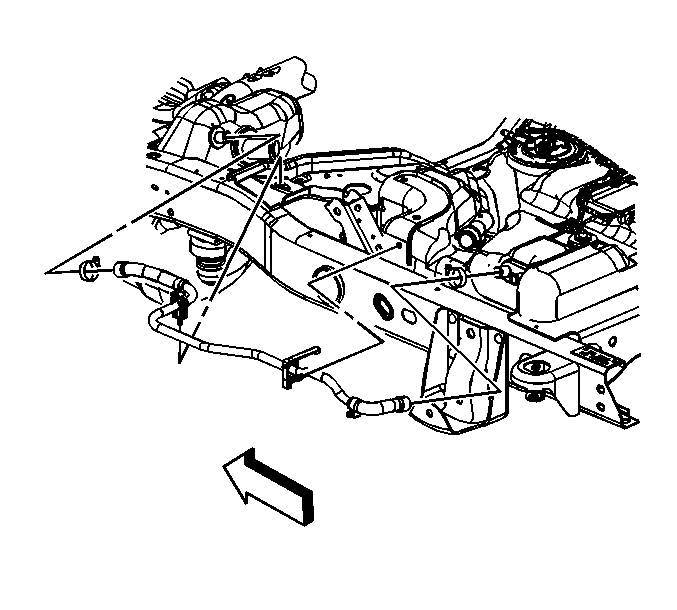
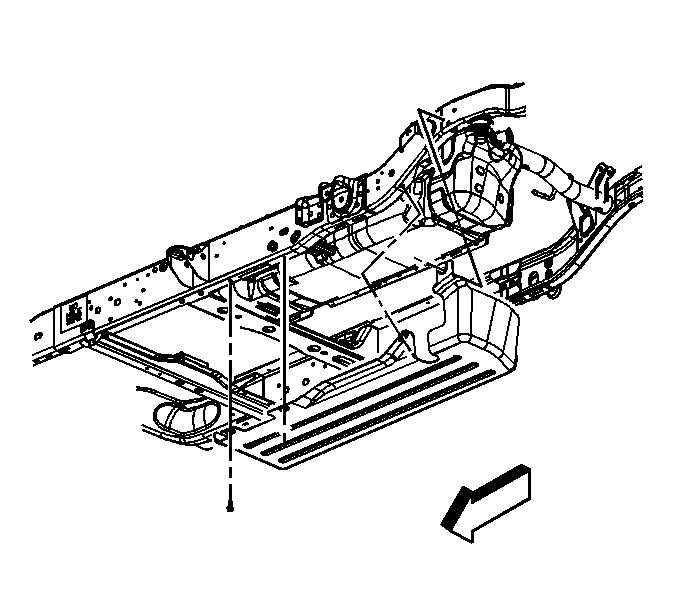
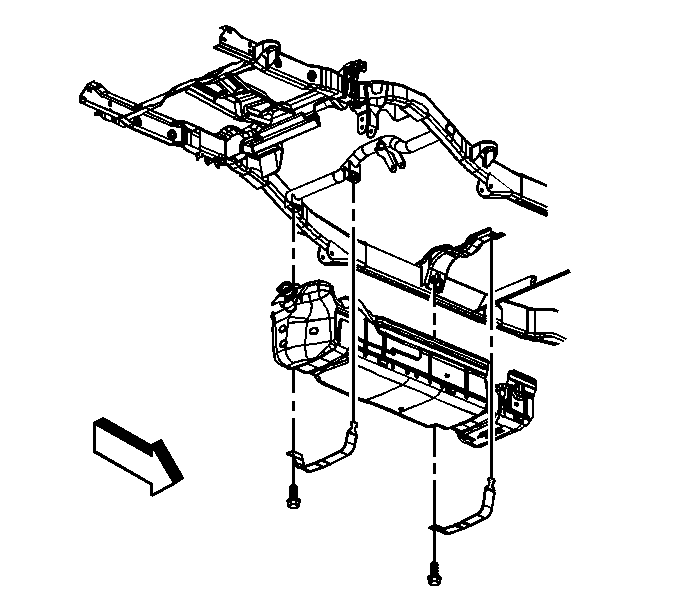
Notice: Do not bend the fuel tank straps. Bending the fuel tank straps may damage the straps.

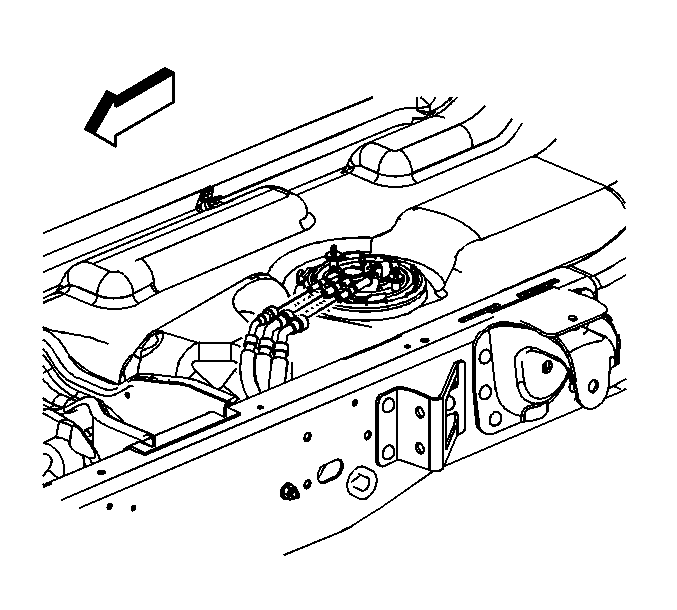
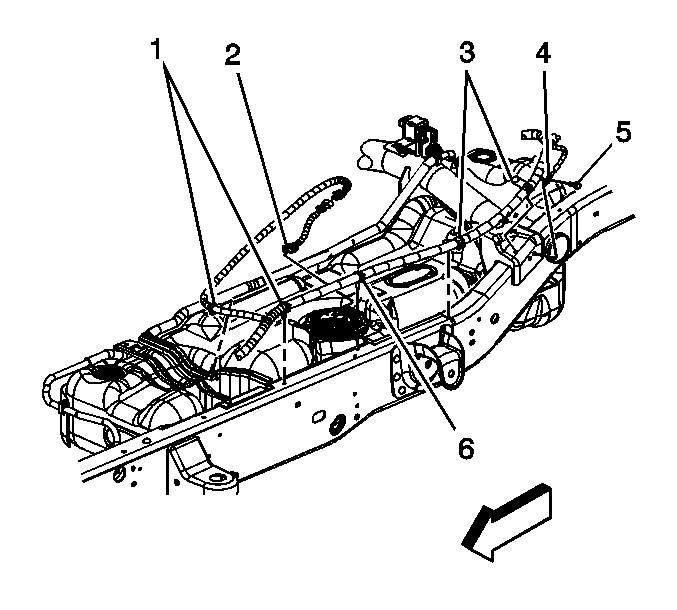
Installation Procedure
- Remove the caps from the fuel and EVAP pipes.
- If necessary, install the sending unit. Refer to Fuel Sender Assembly Replacement .
- Place the fuel tank onto a suitable jack.
- With the aid of an assistant, partially raise the fuel tank.
- Connect the sending unit electrical connector (2).
- Install the CPA retainer.
- Connect the fuel feed, return, and EVAP pipes to the sending unit.
- If equipped, install the sending unit shield.
- If equipped, install the sending unit shield nuts.
- With the aid of an assistant, completely raise the fuel tank.
- Install the fuel tank straps.
- Install the fuel tank strap bolts.
- Remove the adjustable jack from the fuel tank.
- If equipped, install the fuel tank shield.
- If equipped, install the fuel tank shield bolts.
- Install the vent hose to the front tank.
- Tighten the vent hose clamp at the front tank.
- Connect the pipe to the fuel tank valve. Refer to Plastic Collar Quick Connect Fitting Service .
- Install the EVAP canister. Refer to Evaporative Emission Canister Replacement .
- Lower the vehicle.
- Refill the fuel tank.
- Install the fuel fill cap.
- Connect the negative battery cable. Refer to Battery Negative Cable Disconnection and Connection in Engine Electrical.
- Use the following procedure in order to inspect for leaks:



Notice: Use the correct fastener in the correct location. Replacement fasteners must be the correct part number for that application. Fasteners requiring replacement or fasteners requiring the use of thread locking compound or sealant are identified in the service procedure. Do not use paints, lubricants, or corrosion inhibitors on fasteners or fastener joint surfaces unless specified. These coatings affect fastener torque and joint clamping force and may damage the fastener. Use the correct tightening sequence and specifications when installing fasteners in order to avoid damage to parts and systems.
Tighten
Tighten the nuts to 10 N·m (89 lb in).

Tighten
Tighten the bolts to 40 N·m (30 lb ft).

Tighten
Tighten the bolts to 15 N·m (11 lb ft).

Tighten
Tighten the clamp to 2.5 N·m (22 lb in).
| 24.1. | Turn the ignition ON, with the engine OFF, for 2 seconds. |
| 24.2. | Turn the ignition OFF for 10 seconds. |
| 24.3. | Turn the ignition ON, with the engine OFF. |
| 24.4. | Inspect for fuel leaks. |
Fuel Tank Replacement Dual Tanks - Rear
Removal Procedure
- Relieve the fuel system pressure. Refer to the Fuel Pressure Relief .
- Remove the spare tire stowage lock cylinder.
- Remove the spare tire.
- Drain the fuel tank. Refer to Fuel Tank Draining .
- Remove the rear exhaust insulator.
- Remove the spare tire hoist crossmember bolts and crossmember.
- Loosen the fuel tank fill hose clamp at the front tank.
- Separate the fill hose from the front tank.
- Loosen the fuel tank fill pipe hose clamp at the rear tank.
- Separate the fill pipe hose from the rear tank.
- Loosen the vent hose clamp at the rear tank.
- Separate the vent hose from the rear tank.
- Support the fuel tank with a suitable jack.
- Remove the fuel tank strap bolts.
- Remove the fuel tank straps.
- Open the retaining clip.
- Remove the fill hose from the clip.
- Disconnect the EVAP pipes (2). Refer to Plastic Collar Quick Connect Fitting Service .
- Disconnect the fuel pipe at the fuel sending unit (1). Refer to Metal Collar Quick Connect Fitting Service .
- Cap the EVAP and fuel pipes, in order to prevent possible EVAP/fuel system contamination.
- With the aid of an assistant, partially lower the rear tank.
- Disconnect the fuel tank electrical connectors.
- Completely lower the fuel tank.
- With the aid of an assistant, remove the tank from the jack.
- If necessary, remove the sending unit. Refer to Fuel Sender Assembly Replacement .
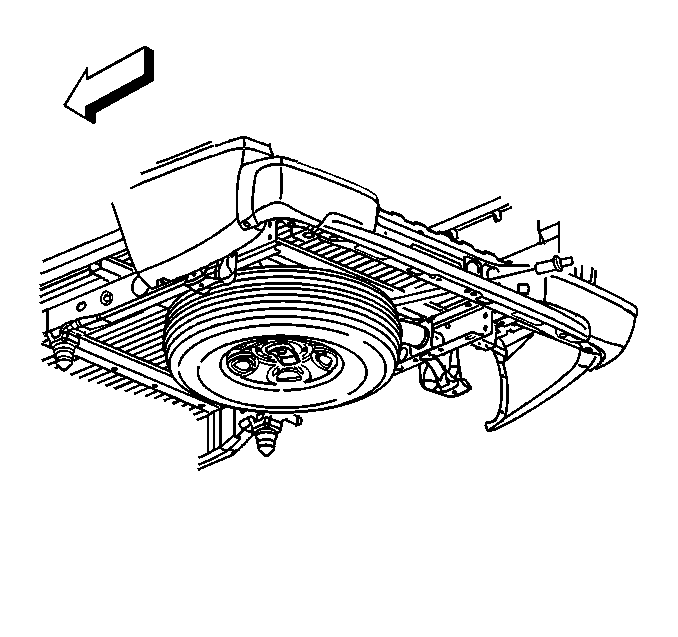
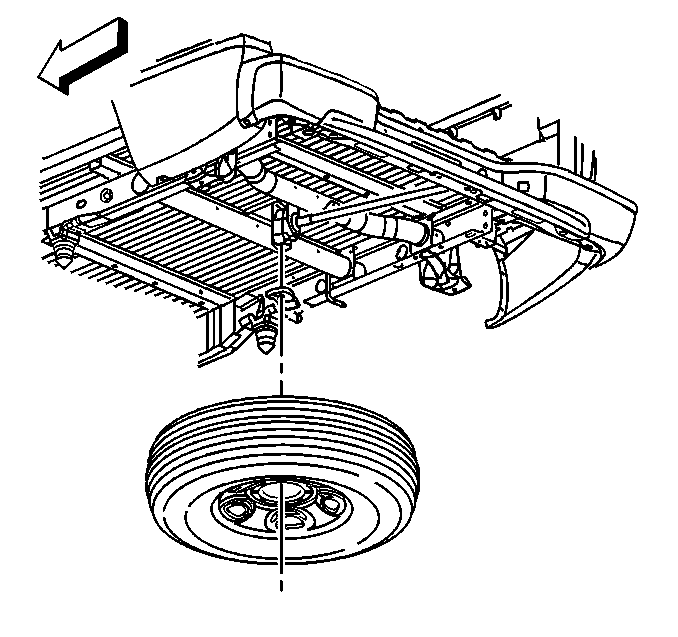
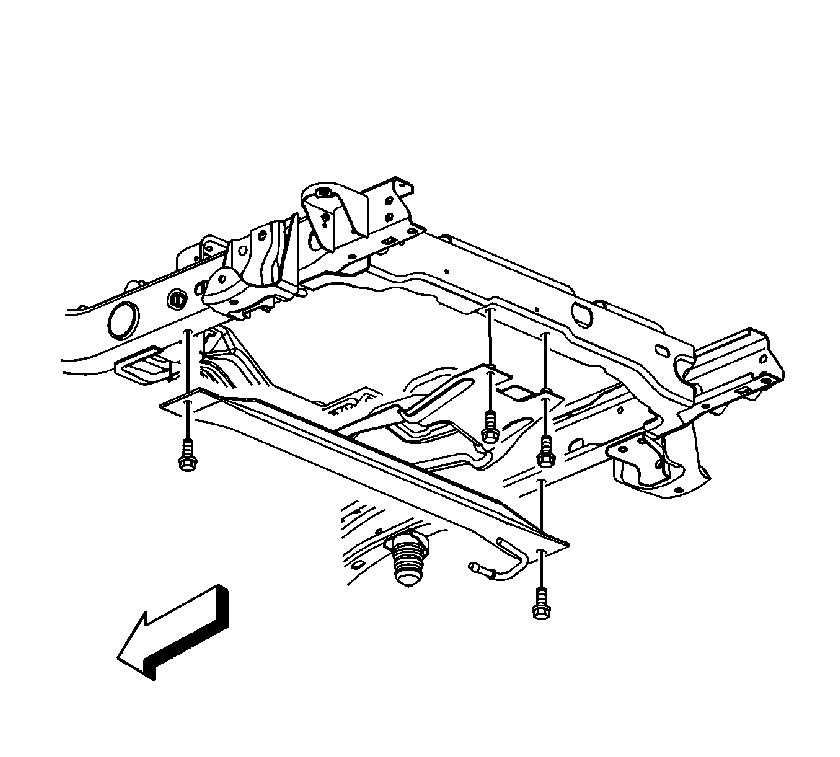
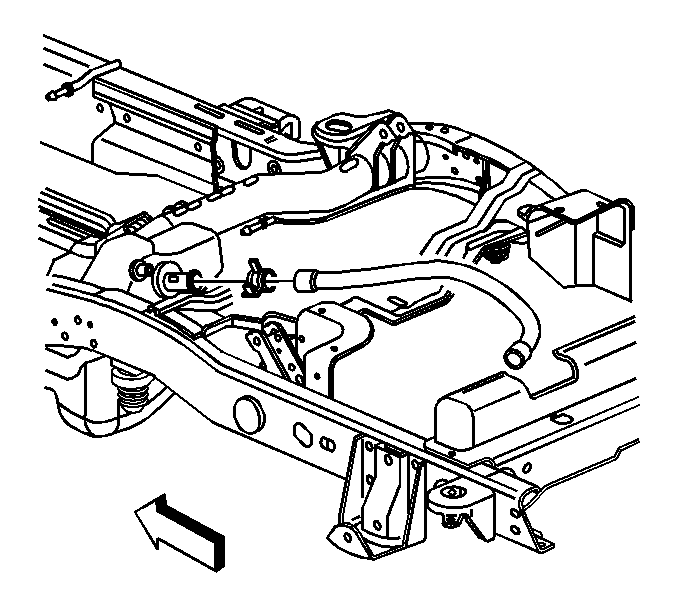
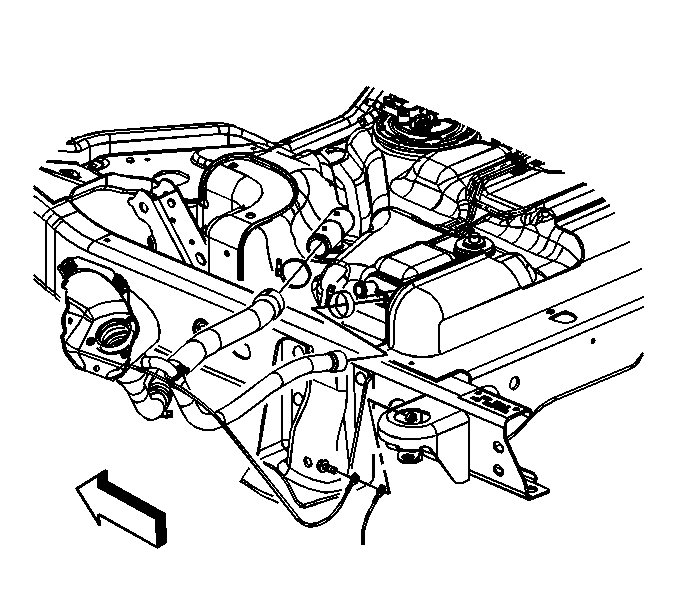
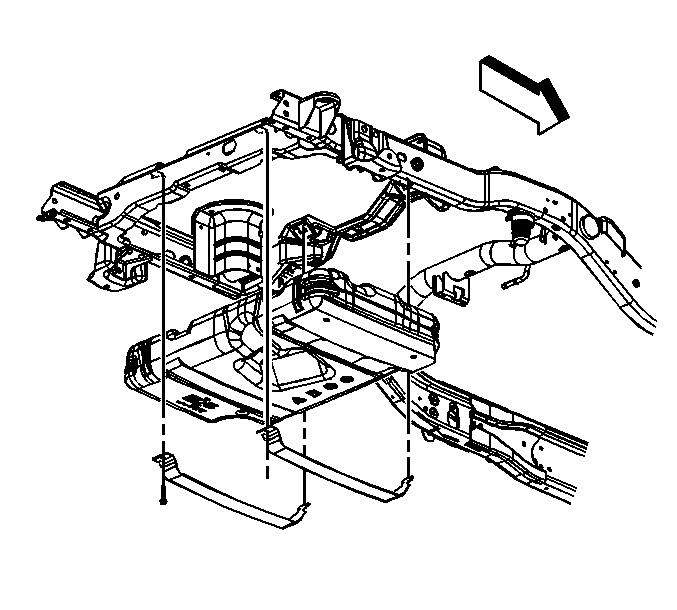
Notice: Do not bend the fuel tank straps. Bending the fuel tank straps may damage the straps.
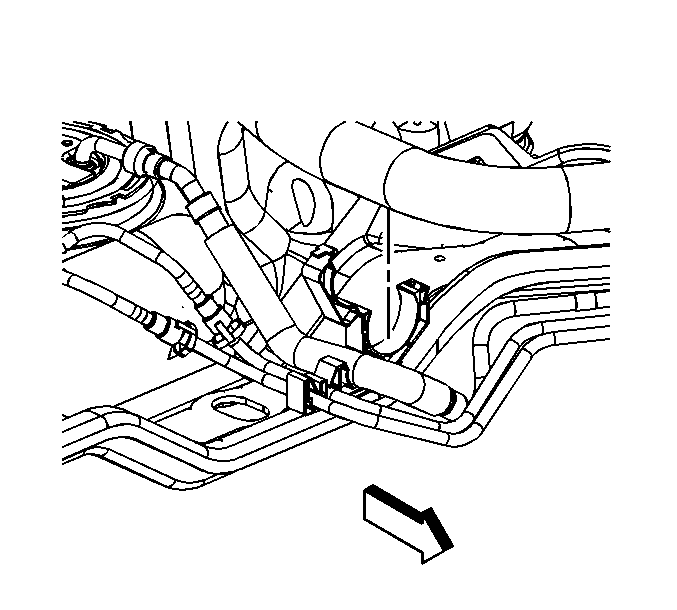
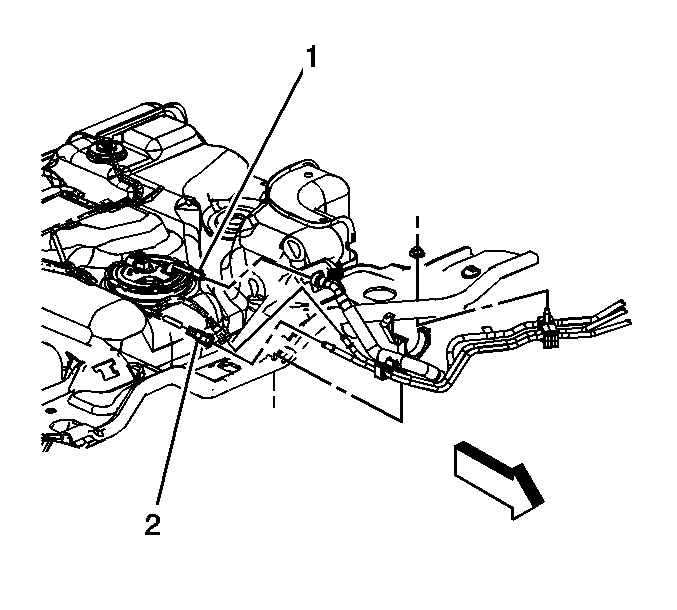
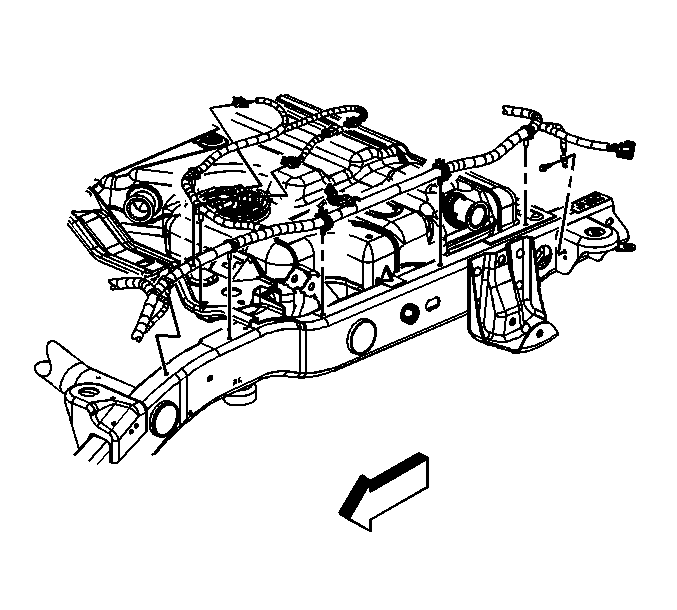
Installation Procedure
- If necessary, install the sending unit. Refer to Fuel Sender Assembly Replacement .
- With the aid of an assistant, install the tank onto the jack.
- Raise the fuel tank until the electrical connection can me made.
- Connect the fuel tank electrical connectors.
- Remove the caps from the EVAP and fuel pipes.
- Connect the fuel pipe at the fuel sending unit (1). Refer to Metal Collar Quick Connect Fitting Service .
- Connect the EVAP tubes (2). Refer to Plastic Collar Quick Connect Fitting Service .
- Install the hose to the retaining clip.
- Close the retaining clip.
- Completely raise the fuel tank.
- Install the fuel tank straps.
- Install the fuel tank strap bolts.
- Remove the jack from the fuel tank.
- Install the vent hose to the rear tank.
- Tighten the vent hose clamp at the rear tank.
- Install the fill pipe hose to the rear tank.
- Tighten the fuel tank fill pipe hose clamp at the rear tank.
- Install the fill hose to the front tank.
- Tighten the fill hose clamp at the front tank.
- Install the spare tire hoist crossmember and bolts.
- Install the rear exhaust insulator.
- Lower the vehicle.
- Install the spare tire.
- Install the spare tire stowage lock cylinder.
- Refill the fuel tank.
- Install the fuel fill cap.
- Connect the negative battery cable. Refer to Battery Negative Cable Disconnection and Connection in Engine Electrical.
- Use the following procedure in order to inspect for leaks:




Tighten
Tighten the bolts to 40 N·m (30 lb ft).

Tighten
Tighten the clamps to 2.5 N·m (22 lb in).

Tighten
Tighten the clamp to 2.5 N·m (22 lb in).

Tighten
Tighten the bolts to 50 N·m (37 lb ft).


| 28.1. | Turn the ignition ON, with the engine OFF, for 2 seconds. |
| 28.2. | Turn the ignition OFF for 10 seconds. |
| 28.3. | Turn the ignition ON, with the engine OFF. |
| 28.4. | Inspect for fuel leaks. |
